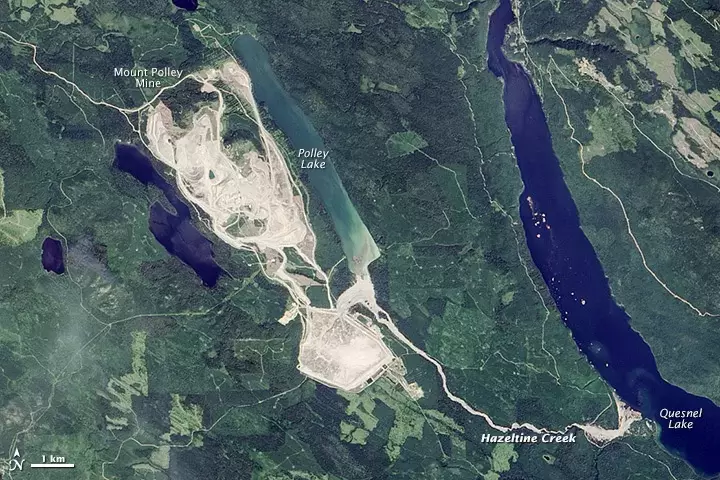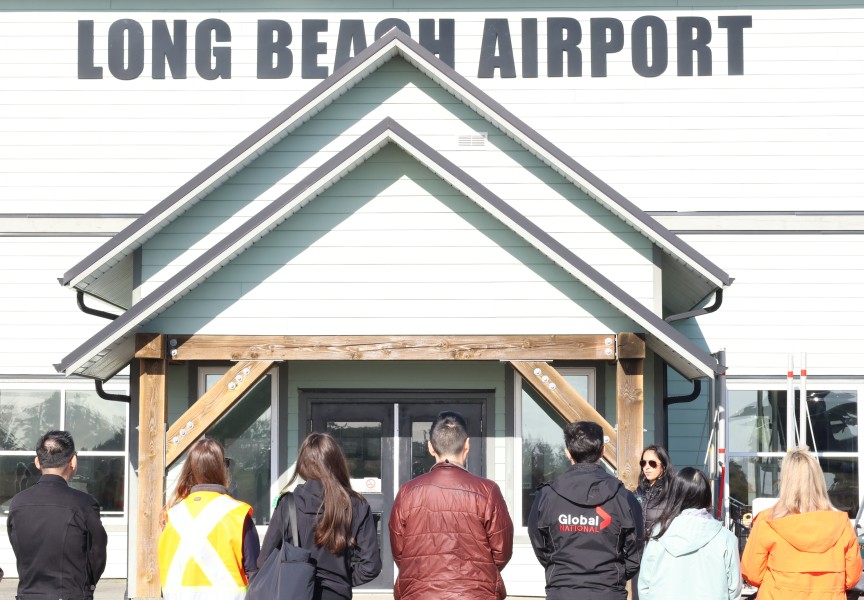A mining company with interests in the territory of the Tla-o-qui-aht First Nation faced opposition Thursday at the corporation’s annual general meeting in the Vancouver area.
A group confronted Imperial Metals’ executives and shareholders at the Coquitlam Executive Plaza as proceedings began on May 25, citing rights violations within the unceded territory of the Secwepemc First Nation in central B.C. It is in this area that Imperial Metals’ Mont Polley gold and copper mine spilled millions of cubic metres of toxic water and mud in August 2014.
Secwepemc members and their supporters, which included some Nuu-chah-nulth peoples, faced a dozen RCMP officers waiting for them at the AGM location. At least one person was arrested, said Kanahus Manuel of the Secwepemc Warriors Society.
“We had confrontation with the RCMP that were deployed on scene,” she said, adding that the Mount Polley mine must be shut down. “Right now they’re discharging right into Quesnel Lake, which is a sacred area to our people. It’s a home to one of the largest sockeye salmon spawning grounds and it’s actually the deepest glacier-fed lake in the world.”
The Mount Polley mine spill, which affected a sacred Secwepemc area known as Yuct Ne Senxiymetkwe, is widely considered one of the worst environmental disasters in modern B.C. history. Imperial Metals’ operations have violated the United Nations Declaration of the Rights of Indigenous Peoples, said Manuel. This international declaration states that Aboriginal Peoples have the right to block development on their land if it is being undertaken without consent.
Manuel and her Warriors have come to each Imperial Metals AGM since the Mount Polley spill.
“We need to continue to put pressure on all the right places,” she said. “They needed to see our brown faces in front of them, and they need to continue to see that there’s opposition by indigenous people to these mines.”
The B.C. government allowed the Mount Polley mine to reopen two years after the disastrous spill, citing environmental reports commissioned by the province that show normal levels of metal in fish and non-toxic surface water in the area. The Caribou Regional District supported the mine’s reopening, stressing its importance for the local economy.
Imperial Metals has also met opposition around Vancouver Island in recent years. The mining company approached the Tla-o-qui-aht about re-opening a gold mine in Tranquil Valley at a place called Onadsilth-Eelseuklis, but the First Nation decided to resist the development after hearing of toxic chemicals used in tailings pond facilities.
“It’s a closed gold mine and they wish to do exploratory drilling to determine the length of the mineral vein,” explained Saya Masso, lands and resource director for the Tla-o-qui-aht First Nation.
Following the Mount Polley disaster, the Tla-o-qui-aht removed Imperial Metals workers from the area as the company continued with an environmental assessment.
“Mining is a non-permissable use, it runs contrary to our cultural plan, our spiritual plan, our fishing, our drinking water plan,” said Masso. “Our land use plan is an employment plan for hundreds of years of employment. The mining is 12 years of employment and thousands of years of impact. There’s still mines in Rome or Greece that leach acid and different things into the watershed thousands of years after the mine has closed.”
In 2014 the Tla-o-qui-aht declared that their entire territory would be a tribal park where land would be conserved for future generations. The First Nation has chosen to explore tourism and micro-hydro initiatives rather than mining and industrial logging.
“Our land use plan encompasses wild fish restoration - valuing salmon and fish as an economy - eel grass and bear watching for tourism,” said Masso. “It encompasses our cultural plan and our spiritual plan.”







